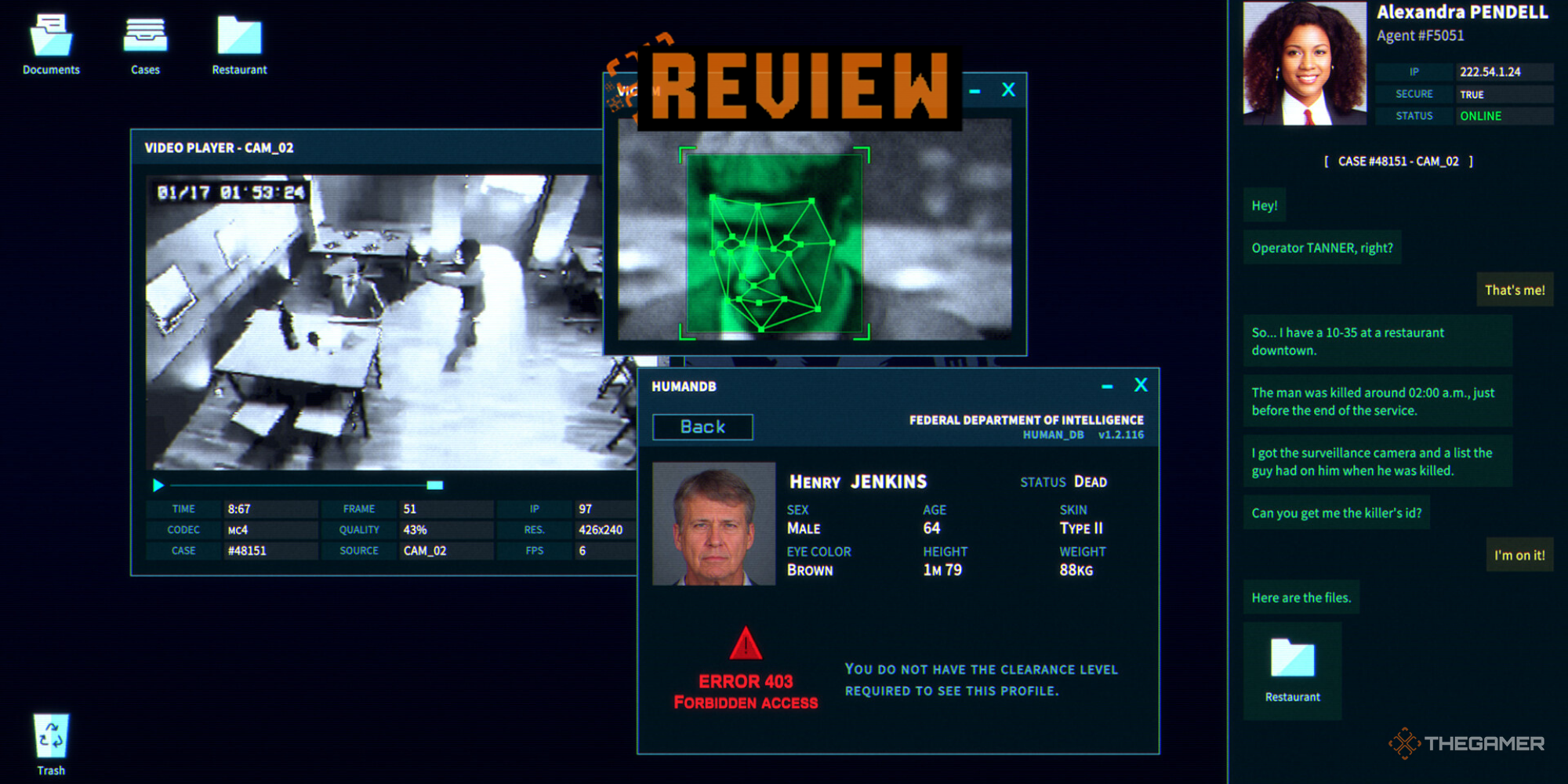
Summary
- Story-driven gameplay immerses players in solving cases as Evan, with believable technology and puzzles.
- The game's intricate plot requires close attention, with dialogue choices influencing outcomes, creating a rich detective experience.
- While the concept is fresh and compelling, the cliffhanger ending may leave players unsatisfied, hinting at a sequel for unresolved mysteries.
The Operator’s biggest problem is that it doesn’t have plot holes. I know that sounds strange, but it’s not that its narrative is tied together so tightly and flawlessly that everything makes sense – it’s more that it feels like some specific lines of dialogue and writing were thrown in specifically to explain away plot holes that arise from narrative inconsistency. But I’m getting ahead of myself.
This is the kind of game where plot holes matter. I’m not nitpicking – the story being fed to you is the entire experience. You play as Evan Tanner, a brand new employee of the Federal Department of Intelligence, or the FDI. It’s your first day at work, and as an Operator, your job is to assist agents in the field by analysing evidence with cutting-edge technology, fact checking, and even doing lab work remotely.
The game is adept at making you feel like you’re actually doing this work by simulating a PC interface with a desktop complete with pre-installed applications. As you’re connected with agents, their portrait, name, ID number, and other details will pop up in a sidebar, and your conversation with them will be transcribed. The interface, icons, and applications all feel sufficiently retro that the ‘90s setting is convincing, but the time period feels at odds with the futuristic media analysis technology you interact with.
Analysing photos or video means clicking on different parts of the grainy footage and somehow identifying faces automatically. It’s very CSI.
Agents may send you files to cross-reference and pore over, and your current goal will pop up in a bar on the top of the screen. Everything you’ve collected conveniently auto-populates in a folder on your desktop, and you can refer to any of these files whenever you see a connection between different cases. One early case has an agent telling you about a woman who claims to have been abducted by aliens, and you’ll have to scrutinise the evidence to find inconsistencies. Once you find that inconsistency, you can select the goal in the bar, and match it to the evidence you’ve found. Getting the answer wrong doesn’t change anything, as far as I can tell, though mistakes will likely lead to your supervisor commenting on your mediocre performance.
The Operator is generally a very linear game – though you can choose different dialogue options in conversations and sometimes make your own decisions, a lot of dialogue is locked in and the final outcome is set.
It’s extremely fun to play at being a CSI agent, despite the suspension of disbelief required. As a longtime detective game lover, The Operator scratches my brain just right, giving me challenges that require close attention, but never stray over the line into being frustrating. There is a larger conspiracy at play in The Operator, and you start uncovering it as early as your first day, when a hacker named HAL takes over your system and begins communicating with you. Your responsibilities expand as you begin to cooperate with HAL, leading you to do more and more tasks and take on different sorts of puzzles. The variety is welcome – I imagine just searching through databases all day would get pretty boring.
This central conspiracy is where The Operator’s believability gets a bit shaky. You have to do a number of things for HAL, and there’s always a convenient, barely explained reason why it has to be you and not them, like “It’s behind a secure system” or something vague like that. It sounds like more CSI-style suspension of disbelief, as if its characters are capable of doing nearly anything until it’s your turn to move the plot forward.
There are other things that, annoyingly, break the immersion that the rest of The Operator so lovingly creates. For example, you’ll often be talking to people, sometimes two people at the same time. Every conversation is fully (and well) voice acted and started through accepting a call, but while swapping between conversations on the screen feels natural, the moment you realise the characters on the other end of the line are just sitting silently and waiting for you to do what you’re told, even in moments of panic, that immersion is broken.
The section markers within conversations are also a bit silly – they go from case numbers and the like to phrases like “Your Thoughts” and “It Matters”. I can see that in the conversation, you don’t have to tell me that.
Many of the puzzle mechanics stretch the limits of believability too far – at some point you have to analyse a physical sample, which means staring at a manual full of formulas and figuring out exactly what figures to put into the application. It had me doing maths, which I cannot imagine is how actual lab analysis works.
Another issue is that it’s surprisingly difficult to tell what’s diegetic and what’s not. Everything in the game feels limited to what you, Evan, can actually see, but there are sometimes unexplained music and sound stings for dramatic effect that don’t make sense in the context of the larger game. The same goals that appear in the bar on your screen as you are directed to find things for agents also appear when you do things for HAL, which doesn’t really make any sense.
Speaking of what Evan can see, whenever he leaves his desk, the game treats you to a blurry abstraction of his surroundings, complete with sound design to gesture at what’s going on around him. It’s a nice touch, and ties in to a later revelation.
One particularly egregious mismatch of story and gameplay comes late in the game, when you’re asked to identify something but it’s pretty clear from contextual clues that that something is yours. You can’t just say it’s yours, though it’s painfully obvious – you have to pull your own name up in the database and click on it to answer. This is one of the rare moments in the game when I rolled my eyes.
However, The Operator commits a far bigger sin than anything I’ve mentioned so far. The game is fairly short (I finished it in just over three hours) and sets up quite a large mystery that it doesn’t even attempt to resolve. Its ending, which I won’t spoil, creates an even bigger mystery that’s explicitly setting up a sequel, leaving everything up in the air. It’s a cliffhanger with no resolution, and a wholly unsatisfying ending.
Despite all this, The Operator’s concept is fresh and compelling, and generally well-executed. Even with my misgivings about the small flaws that made themselves apparent during my gameplay, I thoroughly enjoyed the minute-to-minute experience of playing, and the cliffhanger worked on me – I do want to know what happens next, and how the gameplay will change given the ending’s repercussions. If you’re able to ignore these things, and you love detective games, The Operator packs a lot of fun into a bite-sized package.
Your Rating
close 10 stars 9 stars 8 stars 7 stars 6 stars 5 stars 4 stars 3 stars 2 stars 1 star Rate Now 0/10Your comment has not been saved
Like Follow FollowedThe Operator
Reviewed on PC.
Simulation Puzzle 3.5/5 Released July 22, 2024 ESRB mWHERE TO PLAY
DIGITAL- Great concept
- Compelling story
- Fun puzzles that don?t cross over into frustrating
- Ending is a cliffhanger and doesn?t offer a conclusion
- Sometimes sacrifices narrative and gameplay coherence for drama













